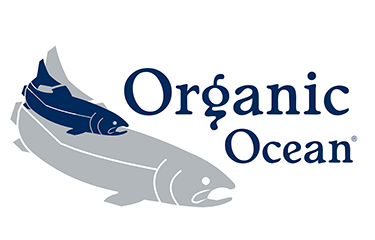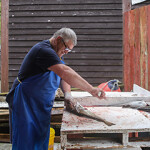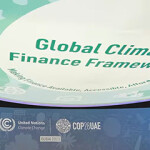The Top 25: Organic Ocean Q&A

Organic Ocean is featured in The Top 25: Sustainability & Conservation list, published by SeafoodSource on 24 September, 2020.
SeafoodSource: What kind of trends have informed Organic Ocean’s latest sustainability/conservation efforts?
Organic Ocean: Since it was established (in 2008), Organic Ocean has focused on all three areas of sustainability – environmental, social, and economic – on the basis that it could not achieve positive environmental impact in the absence of financial viability. Similarly, Organic Ocean determined that positive environmental impact was not meaningful if it did not also accompany social benefit. In this regard, the corporate ethos centers on a strong belief in driving favorable socio-economic impacts particularly among fishers and the coastal and in-river communities in which they reside and work. Perhaps the best example of which is a strategic partnership with an indigenous fisheries cooperative in which Organic Ocean provides go-to-market infrastructure and strategy.
While the initial focus was directed at fisheries in the Pacific Northwest, Organic Ocean’s success in that region has drawn interest from other global fisheries and NGOs which are looking at replicating the model. One such improvement project involves a collaboration with Future of Fish and the World Wildlife Fund in which better harvesting and processing practices are being developed to enhance the environmental and economic performance of the Peruvian artisanal mahi mahi fishery.
Working with government and NGOs, Organic Ocean’s principals are addressing the key environmental issues including ocean plastics, ghost gear, stock/resource rehabilitation, and the development and support of responsible aquaculture.
Within its own operation, Organic Ocean has been on the forefront of developing and adopting a traceability platform, carbon footprint reduction and recyclable packaging technologies and initiatives.
SeafoodSource: What key features serve to set Organic Ocean’s sustainable seafood offerings apart in the market?
Organic Ocean: Organic Ocean was created by fishers to improve the lot of fishers. From inception, this involved optimizing the value of the resource by incentivizing the adoption of sustainable harvesting and quality handling practices and processes. Emphasizing quality over quantity has increased incomes while reducing the need for high volume, low value commodity production which in the realm of a limited resource has contributed to a race to the bottom. Not only do fishers earn more but by reducing fishing pressure, the fisheries are healthier.
From the perspective of the market, Organic Ocean has cultivated a following of top chefs for whom sustainability and knowing the source are critically important. Through an uncompromising adherence to environmental and quality standards, Organic Ocean provides its customers the assurance that they are receiving all-natural seafood free of therapeutants, treatments, chemical additives, that is supplied in recyclable or compostable packaging and with truth in labeling confirmed through independent third party DNA product analysis. Organic Ocean only supplies seafood that meets an environmental or social responsibility standard. This involves working and partnering with the Marine Stewardship Council (MSC), Seafood Watch, Ocean Wise, and Fair Trade. In addition to being one of the first seafood suppliers in the world to achieve B Corporation status, Organic Ocean was an early member and continues to participate in the 1% for the Planet program through which Organic Ocean supports a stream keeping program conducted by high school and university students.
Organic Ocean has demonstrated that it is “being good by doing good.” By providing its customers with better quality, sustainable seafood, and a positive “story,” the customers garner better reviews, the servers receive bigger tips, and the profitability of the establishment is enhanced.
Organic Ocean has leveraged its success in high-end food service with the creation of a direct-to-consumer (D2C) program that enables access to the same seafood provided the culinary market to retail customers at essentially the same wholesale cost. The success of the D2C initiative has enabled Organic Ocean to increase and extend its corporate social responsibility program which is built upon the donation of high quality, nutritious seafood to the most needy members of the communities which Organic Ocean supplies.
SeafoodSource: How does sustainability factor into your overall mission and strategy as a business?
Organic Ocean: Sustainability is part of our DNA and all our products must have a sustainability or responsibly sourced component associated with them. We are also unique in that our company was founded by fishers who were first movers in the adoption of sustainability (long before it was fashionable). Our people actively participate in industry affairs and count among their roles: Chair of the B.C. Salmon Marketing Council, President of Canadian Highly Migratory Species Foundation, Director of Ocean Wise, Member of the Seafood Watch Multi Stakeholder Group, Secretary Treasurer of the Gulf Trollers Association, Director of the Pacific Prawn Fishermen’s Association, and Member of the Commercial Salmon Advisory Board. We believe it is important to walk the talk and as an example, closed our business on Friday, 27 September, 2019 so that all our employees could march together in the Global Climate Strike.
SeafoodSource: How does Organic Ocean approach sustainable, responsible development?
Organic Ocean: We encourage active cross-sectoral engagement to achieve sustainability objectives. This involves collaboration with commercial, recreational, and indigenous fishers, conservation groups, government and other industry members in a pre-competitive nature. While that may sound obvious, bringing together these stakeholders who have a history of promoting disparate interests is not trivial. However, advocating cooperation over competition is proving effective in terms of advancing a sustainability agenda that stands to benefit all. Moreover, our strong belief is that a focus on continuous improvement leads to positive change within our industry and is one of the reasons we wholeheartedly support FIPs.





Share